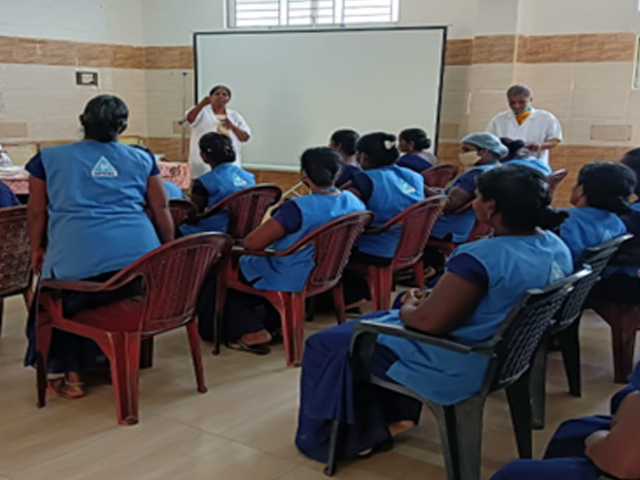Hospital Infection control committee:
The infection control committee consists of the Dean, Medical Superintendent, RMO, Professor and Head of Microbiology, Infection Control Officer, Nodal officer – BMWM, Head of All Clinical Departments, Head of Pharmacology & Community Medicine, Chief Pharmacist, Matron, Nursing Superintendents & Staff Nurses incharge of Infection Control , BMWM, CSSD, Laundry, Nursing Superintendent i/c of Kitchen Department, JAO, Planning & Development Section Assistant, Outsourcing Agency Manager.
Biomedical waste committee:
The Biomedical Waste Committee consists of Dean, Medical Superintendent, RMO, Professor and Head of Microbiology, Nodal officer – BMWM, Head of All Clinical Departments, Head of Pharmacology & Community Medicine, Matron, Nursing Superintendents & Staff Nurses Incharge of Infection Control, BMWM, CSSD, Laundry, JAO, Planning & Development Section Assistant, Out sourcing Agency Manager.
Bio medical waste management:
Proper management of BMW is highly essential for the reduction of various risk factors to human health & surroundings ecosystem. The objective of biomedical waste management is to prevent the risk of spreading diseases, to protect the health and well being of health care workers & the community against the potentially fatal infection. For implementation of the above, the four categories of biomedical waste are segregated at the point of generation itself into the color coded containers, then transported to the central storage area of the hospital and from there it is transported to the CBMWTF for treatment and disposal of biomedical waste. The hospital has a MOU with MEDICARE ENVIRO SYSTEMS (CBMWTF), Thanjavur .
Training:
Training on Biomedical waste management, hand hygiene, PPE donning & doffing and bundle care approaches are conducted for Doctors, paramedical staffs & sanitary workers periodically by the Department of Microbiology.
Academics:
The faculties in the Department of Microbiology are actively involved in teaching & training the MBBS Students and paramedical students. During the course of MBBS a student of Microbiology, learns the basics of every infectious disease as to its pathogenesis, diagnosis, management and specific prevention with vaccinations. CBME (Curriculum Based Medical Education), is carried out for 150 MBBS students. The CBME involves new teaching methods like small group discussion, case based learning, AETCOM (Attitude Ethics and Communication), OSPE (Objective Structured Practical Examination), DOAP (Demonstrate Observe Assist Perform), integrated teaching other than lectures. New assessment methods like formative assessment of classroom learning, assignments, integrated sessions, case based learning, self directed learning, AETCOM learning are carried out.
The Department of Microbiology at Government Medical College Ariyalur is well-equipped with a student practical Laboratory, Research Laboratory, Museum, Demonstration Room, Department Library and Lecture Hall.
- Microscopy- Gram’s stain /Acid Fast stain / Modified Acid Fast stain / Albert’s stain / Hanging Drop / KOH Mount / Wet Mount.
- Bacteriology - Culture and Sensitivity of Blood / Ascitic Fluid /Pleural Fluid / Synovial Fluid / CSF / Pus / Urine / Sputum / Stool / High Vaginal Swab / Wound Swab / Ear Swab / Eye Swab / Throat Swab / Tissue.
- Immunology - RPR test, Widal test, ASO test, Rheumatoid factor test, C- reactive protein test.
- Serology -Scrub typhus IgM ELISA
- Parasitology - Stool Examination for intestinal parasites / ova / cyst, Rapid card test for malarial parasites
- Mycobacteriology - Microscopy of sputum and other clinical specimens for Mycobacteria.
- Virology - ELISA for Dengue NS1, IgM, HBsAg, Anti HCV, HAV IgM, HEV IgM, Rapid card test for HBsAg, Anti HCV
- ICTC - Our ICTC performs HIV diagnostic tests, provides basic information on the modes of HIV transmission, and promotes change to reduce vulnerability and link people with other HIV prevention, care and treatment services.
- Mycology - Preliminary identification (Microscopy – KOH Mount/ Gram Stain / negative staining) and culture of fungi from the various clinical specimen.
- Molecular diagnosis by RT- PCR - is done for Covid – 19 detection. Viral loads for Hepatitis B and Hepatitis C are also done to facilitate the treatment.
- We play an important role both in HICC (Hospital Infection Control Committee) & BMWM (Biomedical Waste Management) in the prespective of conducting the training to medical & para medical staffs in hospital. Our Diagnostic Microbiology lab performs air, water & surface surveillance culture for operation theatres, ICUs and other high risk areas.
- Our Diagnostic Microbiology department participates in EQAS (External Quality Assurance Scheme) programs periodically to maintain the quality of lab’s performance and to achieve added confidence in accuracy of the patients test results.
- We are also involved in IDSP (Integrated Disease Surveillance Program) and NHVCP (National Viral Hepatitis Control Program).
| S. No. | Post | Name of the Faculty |
|---|---|---|
| 1 | Professor | Dr. David Agatha |
| 2 | Assistant Professor | Dr. R. Vinotha |
| 3 | Assistant Professor | Dr. S. Vimala |
| 4 | Assistant Professor | Dr. V. Sakunthaladevi |
| 5 | Tutor | Dr. S. Subashini |
| 6 | Tutor | Dr. S. Sharmila |
| 7 | Tutor | Dr. S. Elavarasi |
Dr David Agatha- Professor of Microbiology & HOD
- Farzana, David Agatha. Sputum bacteriology, antibiotic sensitivity pattern and C reactive protein levels in patients of COPD with acute exacerbations, JMSCR, 2019 Feb; 07 (02):560-567.
- David Agatha, B. Subitha. Detection of Extended Spectrum β Lactamase and Amp C β Lactamase Resistance in the Gram Negative Bacterial Isolates of Ventilator Associated Pneumonia, Int.J.Curr.Microbiol.App.Sci,2019 Feb ;8 (02) : 1139-1145.
- Sabharritha Sekar, David Agatha. Study of Microorganisms Causing Neonatal Sepsis in a Tertiary Care Hospital and their Antimicrobial Susceptibility Pattern, Int.J.Curr.Microbiol.App.Sci, 2017 October; 6 (10): 669-677.
- David Agatha, G. Sasikala, Anand B Janagond, C. P. Ramani, P. R. Thenmozhivalli. Isolation of Extended Spectrum Beta Lactamase Producing Enterobacteriaceae from Wound Infections in a Tertiary Care Hospital, IJSR, 2014 Jan; 3 (1): 50-52
- G. Sasikala , David Agatha ,Janagond B Anand, Thenmozhivalli P.R. .Characterization of candida and its antifungal susceptibility pattern from patients with vaginal candidiasis in a tertiary care hospital in South India, J Pharm Biomed Sci., 2013 May (Supplement 1); 30(30):S1- S6.
Dr. R. Vinotha – Assistant Professor
Dr. C. Senthil Vadivu 1, Dr. R. Vinotha 2 Evaluation of drug resistance pattern of Mycobacterium tuberculosis in a tertiary care teaching hospital, Int. J. Toxicol. Pharmacol. Res.2023 May; 13(7); 119-124
Dr. S. Vimala- Assistant Professor
S. Thasneem Banu1, S. Vimala2, K.G. Venkatesh3 Identification and analysis of bacterial, viral, and fungal infections in patients with acute meningitis and meningoencephalitis in a tertiary care hospital, Int J Acad Med Pharm 2023 March; 5 (4) ; 1323 -1328
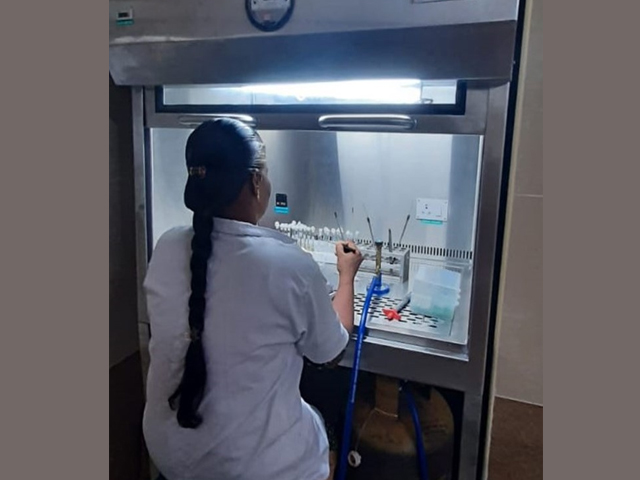
BACTERIOLOGY LAB
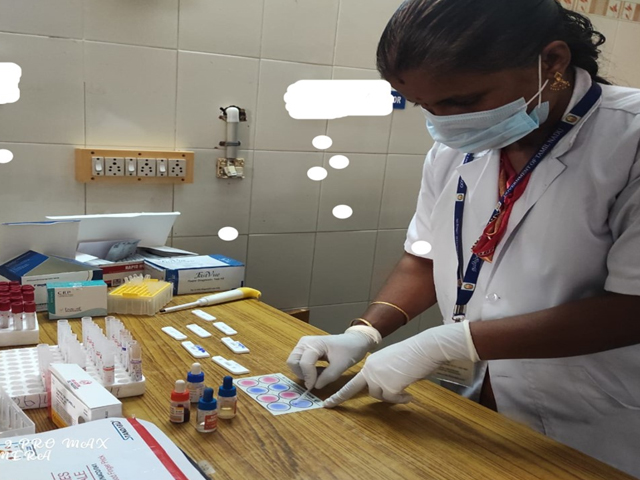
IMMUNOLOGY / SEROLOGY LAB
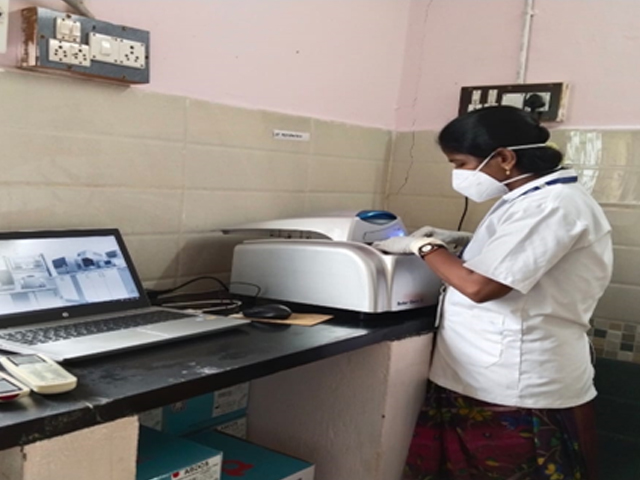
RT PCR LAB
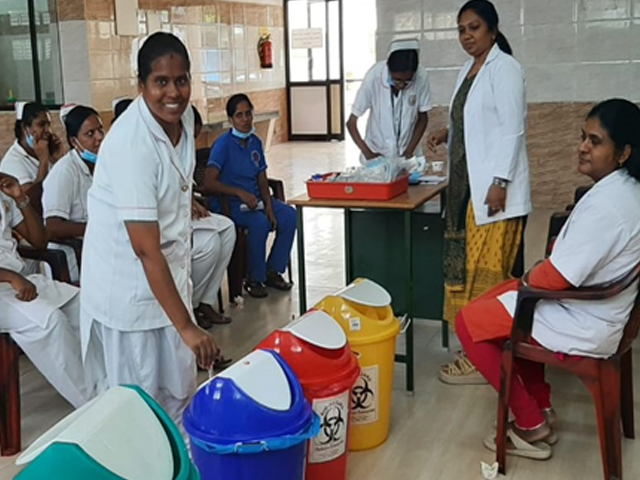
TRAINING ON BIOMEDICAL WASTE MANAGEMENT
